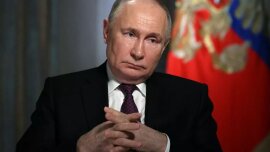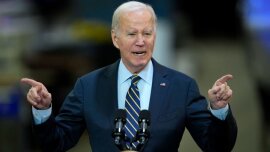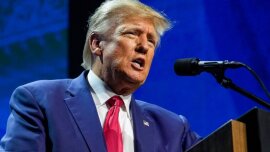The introduction of tough financial and economic sanctions of European and U.S. countries against Russia for starting a war in Ukraine, involving the freezing of the ZVR of the Russian Federation, blocking the banking system by disconnecting from SWIFT, which makes it impossible to further implement international contracts in dollars and euros, forces the Government of the Russian Federation to look for new markets for its main export products - oil and gas.
Allies who support Russia's so-called "special military operation" against Ukraine, fortunately, are not added every new day of the war. The task of Ukrainian diplomacy is to do everything possible to reduce their number to a minimum. We are soberly aware that a priori the position of such countries as North Korea, Syria, Belarus will not be possible to change and "reach" on their sound perception of what is happening and, objectively look at what is happening in Ukraine, for various reasons. We will not analyze this in detail now, I think that every sober analyst not only from Ukraine but also from outside clearly knows the reasons for our unappealable statement.
However, there is a so-called "other group of countries" with which our diplomats and responsible officials can and should persistently "work". In this work, we look forward to significant assistance from the countries of the collective West in building a multilateral dialogue that needs to be "supported" by specific international options and proposals from all Western partners. We also expect that Western partners themselves will hold such bilateral meetings and "targeted" conversations.
So, in the orbit of our common "work" should be Venezuela, Iran, China, India, Pakistan, the United Arab Emirates, and Central Asian countries, primarily Uzbekistan, Kazakhstan, and Turkmenistan.
When proceeding to this work, unfortunately, France and Germany cannot be left without attention. We mention and highlight these two countries - the leaders of the European Union specifically. The "decision" of all EU states mainly depends on the positions of these two countries. And the two European leading states are constantly "wobbling" and seek to limit themselves to half-measures against the aggressor country. Their business is reluctant to "leave" Russian territory, such as Renault, Auchan, Metro. We understand that the investments are considerable, there are controlling stakes of enterprises, such as in AvtoVAZ. But continuing to work there, preserving jobs, deducting taxes to the Russian Federal Budget, they thus sponsor the continuation of the war and the murder of innocent Ukrainian citizens. They "close" from these obvious allegations, fearing forced Russian nationalization. We will advise them to do as other international giant companies, no less large and influential world brands, have done - to instruct their lawyers to be tightly involved in this process - forced legal nationalization is impossible, easily "fends off" in international courts, and will be returned to the rightful owners with Russia's payment of mandatory compensation for illegal actions after the "fall" of Putin No one doubts that this will happen this 2022. Fortunately, Russia itself "decided to help the hesitant" when Putin unanimously stated that he had decided to immediately transfer international settlements to rubles. Germany immediately reacted, stating that this step was unacceptable, and which obviously would lead to a more correct decision - to suspend the purchase of gas and oil from Russia altogether. It's difficult to do it quickly, we understand. Germany wanted to extend the process of "breakup" with Russian energy carriers for a year by building additional terminals for receiving liquefied gas from Qatar, Saudi Arabia, the United Arab Emirates, the United States, and Norway, but Putin's bravado "accelerated" to prudent Germans. Germany truthfully articulated that "it is impossible to abandon Russian gas, oil, coal at the same time," but active work in this direction is already underway. Now they will "pull" with Russia for the currency of calculation of existing contracts. Let's see how this "amazing dialogue" ends.
In general, for such a tight landing on the Russian "energy needle," the Germans should "relentlessly thank" their adored ex-chancellors Schröder and Merkel. They persistently "did not see" the threat to Germany and Europe as a whole of such a "dense planting" on the Russian energy flow. No arguments of European partner countries, the United States and Ukraine were persistently rejected by them. The famous German prudence in this case "played an evil joke", and the world calls to "open your eyes" and see the non-profit nature of gas supplies with two threads of Nord Stream do not indicate the past German myopia, but is obliged to "forcing" the current German leadership to conduct an objective investigation of the very process of making these decisions - who lobbied and convinced of their "usefulness" for both Germany and Europe as a whole. It won't be hard, but the conclusions of the investigation will have to be made and made public. Further - the punishment of the guilty - it will already be a purely German decision.
Along with Germany, President Macron should be the focus of our attention. He has re-elections "on his nose" and makes full use of the Ukrainian-Russian war to "set" political points in front of competitors. He makes loud and not very comments and initiatives on French and international television, which allows him to be in the thick of the most discussed events in the world. But his main aspiration is to become a "Conmediary" between the belligerents. Taking into account the previous French mediation in the Russian-Georgian war represented by President Sarkozy, and most importantly - the historically innate mentality and piety of France before Russia, Putin will certainly not object to such a candidacy of the Facilitator as Macron. And the United States, we are more likely to assume that it will also agree with Macron's candidacy to "enjoy" France for the broken multibillion-dollar contract with Australia for the construction of submarines and the subsequent French diplomatic demarche with the short-term recall of its ambassador from the United States.
And which "intermediary" is acceptable and better for Ukraine: France or Turkey? Russia will not agree with Great Britain and Poland, but it is necessary to "try", especially since Minister Kuleba has the gift of persuading the enemy. We should approach this issue comprehensively and informally.
But let's go back to "another group of countries." Let's start with the "simple." Venezuela is "clamped" by U.S. sanctions on the sale of crude oil. Russia used to help her, but now it is "shoved" by sanctions. If Venezuela is allowed to increase oil production and ensure its guaranteed implementation, Venezuelan oil can replace part of the Russian volume of oil and the country of Venezuela may cease to be an unappealable "admirer" of Russia and at least "correctly" vote when making important international anti-Putin decisions.
Next, is the UAE. Here you can and should inherit the recent American experience. The UAE has served Iran as a kind of sanctions buffer and loophole for many years. This applies primarily to the emirate of Dubai, where a huge Iranian diaspora lives, which "grown" Iranian imports from 2000 to 2008 from $1.1 billion to 13.2 billion. Knowing and understanding this, in March 2011 U.S. Secretary of State Hillary Clinton made a trip to the Gulf countries and "find arguments" for the UAE to join American sanctions against Iran. The Americans could not calmly "watch" how a dedicated UAE bank accepted bank cards issued in Iran. The rest of the UAE banks in their secret work with sanctions Iran when transferring money to or from Iran used the Hawala system (an informal financial and settlement system based on the netting of claims and obligations between brokers). The commission when using Hawala was 1-1.5%, but banks set restrictions on a minimum transaction of $10,000 to $30,000. May now Secretary of State Blinkin and Advisor Sullivan make a targeted visit to this important region.
As for China, after a telephone conversation between President Biden and Chairman Xi Jinping, it is quite expected that China has not changed its position towards Russia. He did not join the sanctions, does not call the operation in Ukraine an "invasion" and does not speak on behalf of the Ministry of Foreign Affairs of the People's Republic of China with words of condemnation. China does not increase trade with Russia and does not do anything that can be interpreted as "compensation" for the losses incurred by Russia from Western sanctions. China has simply taken a "wait-and-see" position, which implies not to make obvious "sharp" movements in terms of public military assistance to Russia. We assume that he will refrain from humanitarian assistance for the time being.
I think that China sees signs of "exhaustion" of the Russian aggressor from the military campaign in Ukraine. This keeps China from taking any active steps in the interests of Russia, except for rhetorical statements about "partnership without restrictions". EU countries have no global influence on China. Trade and economic relations between China and the EU are mutually beneficial and tend to increase, so based on the "loss" of the Russian market for the EU states, the latter is not ready to lose the Chinese market. Therefore, the "triangle" China - Russia - USA will have to deal with itself and you should not expect help from the side of Europe.
Taking into account the negative sanctions "example" of Russia, China is now developing ways to protect the Celestial Empire in case a similar sanctions policy is applied to it in case of its "disassembly" with Taiwan. In particular, measures are being prepared to protect national gold and foreign exchange reserves from blocking. Work on the creation of a digital yuan and the development of the Chinese cross-border interbank payment system (CIPS), the Chinese analog of SWIFT, has been accelerated. We note that the issue of joint bank cards "Mir-UnionPay" with Russia has now sharply slowed down.
India is a very important country that needs to be "kept" from providing comprehensive assistance to the Russian Federation and "pulled" it "to the bright" Ukrainian side. Let's say frankly that India's occupation of the "pro-Ukrainian position" will significantly reduce the time of economic collapse in Russia. Currently, New Delhi talks about taking a position of "neutrality" in Russia's unleashed war against Ukraine and does not "condiment" the bombing and murder of Ukrainian civilians, as well as does not support the introduction of a Western sanctions policy against Russia. Such a policy causes not only "misunderstanding", but also "irritation", primarily in us, as well as in Washington.
Until the early 1990s, Anglo-Saxon India was a key base country for the United States, especially for the CIA, in terms of planning and conducting special operations throughout the Asia-Pacific region. Also, India has always been very sensitive to the British crown, listened carefully, and tried to "follow" the course of British foreign policy. But American "consumer" policy without developing its Indian economy gradually "tilted" New Delhi's priorities towards Russia. While the U.S. considered India only as a "ready market" and has only tried to export, for example, recently F-35 aircraft and expensive mobile ground-based anti-missile complex THAAD, Russia has begun to implement a "screwdriver assembly" policy since 2011, helping India to create local defense industry enterprises, such as BraMos anti-ship missiles. This approach allowed Russia to "tie" the Indian military-industrial complex to Russian products through the supply of components and spare parts and, most importantly, to create additional jobs locally and even establish the export of these missiles to the Philippines, thereby "biting off" part of the traditional market from the United States. In addition, Russia, through Rosatom, has signed a protocol of intent with India to involve local IT specialists and oceanographers in its Arctic development projects. I also intend to attract a specialized Indian fleet of container ships for the tasks of the Northern Sea Route. And on the eve of Russia's invasion of Ukraine, clarification of the details of the transaction for the supply of Russian gas to India was in full swing.
That's why New Delhi simply does not have "sufficient motivation to listen" to advice from overseas and "harm" their trade interests with Russia. And according to very recent information, now India does not mind buying Russian oil at a discount despite the imposed sanctions regime against Russia. There is currently a search for "looses" in the sanctions regime to continue trading operations, studying the "experience" of smuggling of Iranian oil by China. It is known that India is the world's third importer of crude oil - about 80% of its own needs are imported oil and it will not happen to "refuse" "become" really cheap Russian oil on its initiative "without third-party pressure".
If we plunge into short history, then with the beginning of the introduction of Iranian sanctions" in 2012, India reduced the purchase of Iranian oil to a minimum. India also did not implement export contracts with Iranian buyers for sugar, tea, and rice. But at that time, India "attack" and "followed" American foreign policy.
Iran-Indian relations in 2012 are fundamentally different from India's relations with Russia in 2022. According to various estimates, the share of Russian military equipment in the Indian arsenal is now from 60% to 85%, so very "convincing arguments" from the countries of the collective West will be needed so that India, contrary to the current trend to deepen Russian-Indian cooperation, "refused" this course.
One of the "levers" of India's belief to "turn away" from Russia's aggressor country may be the threat of imposing sanctions on Brahrs missiles, which are produced jointly with Russia and exported by India, bringing considerable income to the country's budget. The U.S. may also promise to use India's marine potential more tightly regardless of its origin (the flagship of the Indian Navy - the aircraft carrier Vikramaditya, which was modernized in 2013 in Severodvinsk) and provide a "reasonable" price for submarines and F-35 and F/A-18 fighters that India wants to purchase.
The very fact of such a multilateral dialogue will imply that the United States will be conditionally "patient" with India's contacts with Myanma, but provided that they are further "not expanded" in terms of commodity items.
It is known that many American defense experts strongly advise President Biden to use all his influence and opportunities to provide "special discounts and relaxations" to "withdraw" India from Russian influence, which will allow to achieve two important tasks: India can become an "allied", "buffer" or "counterweight" to China in the Indo-Pacific region and, secondly, without
In the analysis, it is important to take into account that on March 24, Chinese Minister Wang Yi left for negotiations in India with his Indian counterpart S. Jaishankar. The main issue at the meeting, of course, will be an attempt to resolve the territorial dispute in the highland region of East Ladakh, where up to 60 thousand people are deployed on both sides of the disputed territory, with heavy weapons and air defense. There is no strategic trust between India and China in this issue, which hinders the development of bilateral cooperation.
For the United States, there is a "window of opportunity" - to use "this as yet insoluble territorial dispute" between the two countries - to offer India a concrete action plan. Of course, this is the risk of moving into a more active phase of the existing hot spot, but it all depends on the ability of American diplomacy to find and "make an offer that is difficult to refuse."
Ukraine, in this regard, is very interested in India's "non-accession" to Beijing's position, which does not support the proposal to exclude Russia from the G20 in response to its war against Ukraine. Undoubtedly, the issues of the Ukrainian-Russian war and the reaction to this "event" will be discussed at the meeting of the two ministers. Today, unfortunately, India's position on the nature of the "absence of the humanitarian crisis" in Ukraine coincides with the position of the People's Republic of China. India and China are not interested in a "weak" and isolated Russia, which, in their opinion today, will lead to a weakening of the regional and world order, in particular in the Asia-Pacific region with a "skew" towards the United States.
Therefore, the Ukrainian authorities should not just "wait" for concrete steps and "movements" on the part of the United States on the Indian-Chinese issue. We urgently need to analyze our Ukrainian-Indian trade relations ourselves to make India a concrete proposal for a significant increase in bilateral trade. We have examples of successful cooperation, for example, from Spetstechnoexort.
Thus, we regard India as the most significant "globally fluctuating state", its "attraction" to "each of the parties" can change the balance of power in achieving Ukrainian interests in the confrontation with Russia, and in the balance of power of American-Chinese interests in the Asia-Pacific region.
As for Pakistan, Ukraine first "bit off" this market from Russia in 1996, concluding the famous "tank contact" providing for the supply of 320 T-80UD tanks totaling $650 million. Ukrainian manufacturer - Kharkiv Plant named after Malyshev managed to bypass the main competitors - Russian "Transmash" (Omsk) and "Uralvagonzavod" (Nizhnetagilsk). It was a breakthrough of Ukrainian armored vehicles. At that time, Ukraine took 9th place in the world in terms of arms exports. The implementation of this contract was monitored by many world countries, and we were "on the verge" of concluding a deal for 1,000 tanks with Turkey. But as always, the internal squabbles in the division of the profit of the "not killed bear" were crowned with a final loss at the very last stage.
Then in June 2002, a new almost $100 million contract was signed for the supply of motor transmission compartments for the first Islamic Al Khalid tank. In this transaction, Ukraine lost 40% of the original value to the Buyer. Again, the reason for this was departmental squabbles and the division of commissions, and the banal drain of the "red price horn". The third tank contract with Islamabad was signed in November 2016 for the modernization and maintenance of the entire tank fleet of the country in the amount of $612 million. The implementation of this contract was accompanied by constant scandals due to the failure of the Ukrainian side to fulfill its obligations on time. Nevertheless, in 2021, during the international specialized exhibition IDEX-2021, Ukroboronprom signed a contract in the amount of $85.6 million for the repair of the T-80UD. The contact is in progress, but "with a squeak." The reasons are still the same - departmental squabble and division of commissions.
Such a Ukrainian "departmental disunity" allowed Russia to gradually "return" Islamabad to the predominant import of Russian military equipment. A significant role today in the "choice" of the Russian position of "no condemnation" of the war in Ukraine was also played by the "street" flight of Americans from Afghanistan, leaving in fact the entire former pro-American leadership of Afghanistan to "tarnish" the Taliban. Pakistan "saw" and "assessed" this step by the United States in its way.
We believe that to change Pakistan's approach in assessing today's events in Ukraine - perhaps even without the "participation" of the United States. Difficult, but possible. Some former leaders of the military-industrial complex of Ukraine, who were "moved" and "removed from the road of earnings" by Poroshenko's team and "did not restore" the current power, had good personal contacts at the highest level with the Pakistani military. In Pakistan, the military has always had a "decisive voice" in the country's foreign policy. Now it is necessary not to look for the reason for the "sudden departure" of our experienced specialists, but to think about how to attract themselves and their connections for the benefit of Ukraine.
And finally, the republics of Central Asia. Six countries of the former USSR have agreements on military cooperation with Russia: Belarus, Armenia, Kazakhstan, Kyrgyzstan, Uzbekistan, and Tajikistan are connected with Moscow through the CSTO defense bloc. Only Belarus publicly supported the Russian "military special operation", as the Kremlin calls it, and Belarus is the only one of these countries to vote against the UN General Assembly resolution condemning Moscow's aggression in Ukraine. All other Russian "allies" abstained from voting. But publicly, their leaders either do not comment on the Russian aggression in Ukraine or take a neutral position and call on the parties for dialogue. Sadly, Georgia also "joined" this "club" of countries that do not condemn Russia and do not call it an aggressor country, despite the events of 2008. Surprisingly, it's a fact. Now is a unique chance to return the annexed territories, but the pro-Russian-minded leadership of Georgia is silent. But that's their business. The Georgian people should independently assess what is happening.
Given today's huge influence of China on Kazakhstan, Turkmenistan, Kyrgyzstan, Tajikistan, which promised to make billions of investments in the economies of these Asian countries, Ukraine is unlikely to change their position through a simple dialogue even with specific examples of Russia's horrors and crimes in Ukraine. We believe that a more integrated approach is needed here, involving the experience and influence of all countries of the anti-Putin coalition.
Thus, to achieve and approach the time of Ukraine's victory in the war against Russia for our statehood and subjectivity, we should not allow ourselves to work with "another group of countries" and use all the reserves and opportunities available to our country.

























